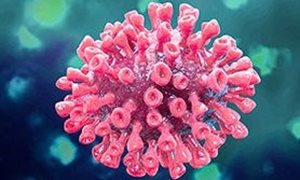22 May 2020
Malaria is a major infectious disease, caused by a parasite with a complicated life cycle in humans and mosquitoes (see "About Malaria" below). The first stage in humans takes place in the liver, the second in the blood. Since the liver phase does not cause any symptoms of disease, but the blood phase does, the purpose of the vaccine is to stop the parasite in the liver.
The most deadly form of malaria is caused by a single-celled parasite, Plasmodium falciparum, which is transmitted by mosquitoes. Once in humans, the parasite first develops in the liver for about seven days. The parasite transforms and shifts from the liver into the blood where it can infect red blood cells. Subsequently, the parasite develops from asexual cells into mature male and female germ cells which can then be sucked up by mosquitoes, after which fertilization of the parasites takes place in the mosquito stomach. The offspring can return to humans after another mosquito bite.

Malaria is a major infectious disease, caused by a parasite with a complicated life cycle in humans and mosquitoes (see "About Malaria" below). The first stage in humans takes place in the liver, the second in the blood. Since the liver phase does not cause any symptoms of disease, but the blood phase does, the purpose of the vaccine is to stop the parasite in the liver.
Weakening malaria
For the malaria vaccine in this study, researchers made a weakened malaria parasite by removing two genes and developed it into a vaccine together with the American company Sanaria Inc. This parasite reaches the first liver stage in humans, but the genetic weakening means that it does not continue to later stages or lead to infection of the blood. In earlier phases of the research, important genes were identified that, in their absence, prevented the parasite from developing in the liver. In a joint clinical study, 67 volunteers in Leiden and Nijmegen received injections of the vaccine made from the genetically modified parasite (called PfSPZ GA1) – a first in the world for an injectable, genetically weakened malaria vaccine. A high and a low dose were administered.Safe and partially effective
The results of the trial show that the vaccine is safe. It does not lead to infection of the blood and therefore does not cause malaria symptoms. It was also observed that the vaccinated volunteers developed an immune defense against a malaria infection, although this protection was not complete. This means that the disease is delayed but not prevented. According to the researchers, the measured immune responses and demonstrated safety are strong incentives to further develop a vaccine based on genetically attenuated malaria parasites.About malaria
Malaria is one of the major infectious diseases of our time with around 216 million cases and 400,000 deaths annually. In recent years there has been an increase in the number of infections, especially in Sub-Saharan Africa and South America.The most deadly form of malaria is caused by a single-celled parasite, Plasmodium falciparum, which is transmitted by mosquitoes. Once in humans, the parasite first develops in the liver for about seven days. The parasite transforms and shifts from the liver into the blood where it can infect red blood cells. Subsequently, the parasite develops from asexual cells into mature male and female germ cells which can then be sucked up by mosquitoes, after which fertilization of the parasites takes place in the mosquito stomach. The offspring can return to humans after another mosquito bite.
Related news items

Rebecca Halbach receives idea generator grant to fight mosquito transmitted viruses
8 July 2020Rebecca Halbach and Pascal Miesen have investigated in a collaborative project whether the treatment of mosquitoes with antiviral drugs can prevent the transmission of mosquito-transmitted viral diseases.
go to page
Invasive fungal infections in influenza and COVID-19
8 July 2020 The Aspergillus fungus is found in the lungs of many COVID patients. A parallel occurs with influenza patients, who often develop a serious fungal infection. Although such a serious fungal infection seems to occur less frequently in COVID-patients, alertness remains necessary, go to page
New step in the development of a vaccine against malaria
22 May 2020 A new vaccine based on rodent malaria parasites achieved a 95% reduction in infection of the liver in humans. An international consortium publishes the results in Science Translational Medicine. go to page
Stuttering DNA orchestrates the start of the mosquito’s life
9 April 2020 A certain type of junk DNA that is found in mosquitoes and which repeats itself dozens of times, known as ‘satellite DNA’, has now been shown to play an essential role in the early development of mosquito embryos. Ronald van Rij and colleagues published their findings in Nature. go to page
NWO Open Competition Domain Science - XS grant for Ronald van Rij and Jenny van der Wijst
21 January 2020NWO Domain Science has awarded Ronald van Rij, theme Infectious diseases and global health and Jennny van der Wijst, theme Renal disorders an XS grant. The XS category emphatically strives to encourage curiosity-driven and bold research involving a relatively quick analysis of a promising idea.
go to page
